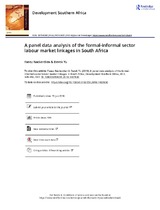| dc.contributor.author | Nackerdien, Faeez | |
| dc.contributor.author | Yu, Derek | |
| dc.date.accessioned | 2021-06-30T07:54:39Z | |
| dc.date.available | 2021-06-30T07:54:39Z | |
| dc.date.issued | 2019 | |
| dc.identifier.citation | Nackerdien, F., & Yu, D. (2019). A panel data analysis of the formal-informal sector labour market linkages in South Africa. Development Southern Africa, 36(3), 329–350. https://doi.org/10.1080/0376835X.2018.1487830 | en_US |
| dc.identifier.issn | 1470-3637 | |
| dc.identifier.uri | https://doi.org/10.1080/0376835X.2018.1487830 | |
| dc.identifier.uri | http://hdl.handle.net/10566/6341 | |
| dc.description.abstract | This study explores the labour market linkages between the
informal and formal sectors, using the first four waves of the
National Income Dynamics Study data. The main focus is on three
groups of employed: worked in the formal sector in all waves;
worked in the informal sector in all waves; moved between the
two sectors across the waves. Only 27% of informal sector workers
in wave 1 transitioned to the formal sector in wave 4; 38%
remained in the informal sector while 33% had their status
changed to either inactive or unemployed. The econometric
analysis indicates that older and more educated individuals living
in urban areas and coming from households with fewer old-age
grant recipients are significantly more likely to work in the formal
sector, whereas more educated white males are associated with a
significantly greater likelihood of transitioning from informal to
formal sector employment. | en_US |
| dc.language.iso | en | en_US |
| dc.publisher | Routledge | en_US |
| dc.subject | Informal sector | en_US |
| dc.subject | Formal sector | en_US |
| dc.subject | Linkages | en_US |
| dc.subject | Labour marker | en_US |
| dc.subject | Panel data | en_US |
| dc.title | A panel data analysis of the formal-informal sector labour market linkages in South Africa | en_US |
| dc.type | Article | en_US |

